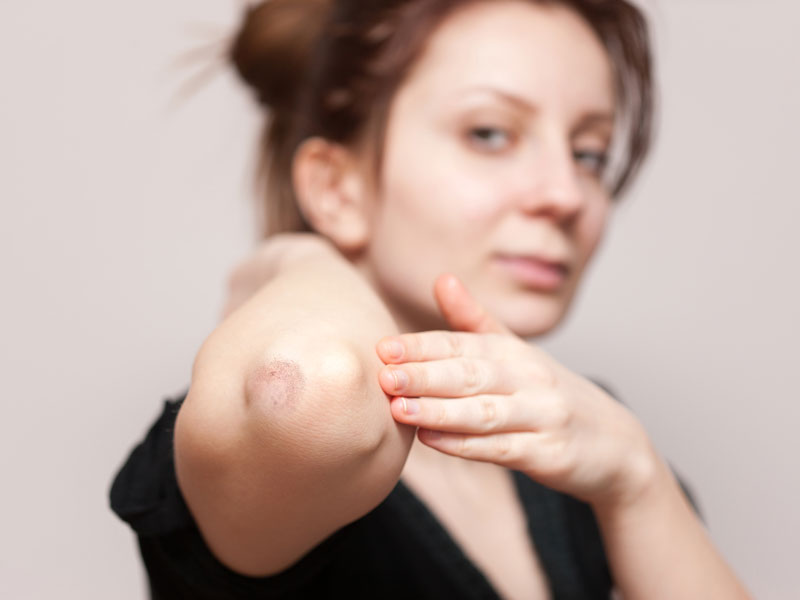About eczema – atopic dermatitis
Atopic dermatitis or eczema is a common skin disorder mainly occurring in young children and babies. The backs of knees and fronts of elbows are most often involved but lesions can occur anywhere including the scalp, face and hands. The condition may rarely be life-long. There is often a family history of asthma, eczema and/or hayfever.
Cause
The cause of atopic dermatitis is not fully known. Genetic factors are certainly important. Researchers believe that defects in skin cells, skin surface microbes and problems with the immune system play a role in the development of the condition.
The role of allergy is more controversial. When special allergy ‘skin prick tests’ are performed on people with atopic dermatitis, they often show positive reactions to many substances encountered in their everyday environment such as house dust mite, animal hair and grasses. However, trying to avoid these things will not improve every person with atopic dermatitis even if they have positive reactions on testing. Food allergies are also more common in patients with atopic dermatitis. These are only rarely of importance. It is uncommon for exposure to food to worsen eczema in an older child. Young babies are the most likely to have their eczema worsened by certain foods but they usually grow out of this by the age of three or four.
Flexural atopic dermatitis
Stress does not cause dermatitis, but it can make it worse. People under stress are more likely to scratch their skin which inflames and worsens the eczema. The inflamed eczema is more itchy and further scratching creates a vicious cycle of scratch – itch – scratch.
Appearance
Management
Atopic eczema is a chronic condition. Clearing the lesions once will not provide a ‘cure’. There is always a chance that it may return at a later stage. Most young children with eczema will ‘grow out’ of their eczema by the time they are teenagers.
Patients with atopic skin should always regard their skin has being extra sensitive. They should wear light, breathable cotton clothing and avoid irritating fabrics on the skin. Common irritants also include chlorine in swimming pools, soaps, shampoos.
‘Cortisone’ creams play an important role in managing atopic dermatitis. If used correctly under supervision, they are very safe. If strong ‘cortisone’ creams are used indefinitely on the skin there is a risk of thinning the skin and making it more fragile. However, with the use of the appropriate strength cream on the appropriate part of the body and having breaks from treatment from time to time, this risk is low. Eczema is more likely to stay away for longer if properly treated.
The type of moisturizer you use will depend on the site of eczema and your personal preference. Even when your eczema is under good control, it is still important to moisturize your skin at least once a day. Pump packs are usually too runny to be very effective for body eczema. Tubs or jars, which have a thicker based cream, are better.
Keeping nails short and cotton gloves may reduce the ability to scratch. When scratching is particularly bad at night, the short-term use of an antihistamine may help.
A course of antibiotics may be required from time to time, particularly with patients with more severe eczema.
‘Cortisone’ (Prednisone) tablets are best avoided except in exceptional circumstances. Whilst the eczema usually responds very rapidly to the tablets, it usually returns even worse after stopping the treatment. Other tablets and light therapy (phototherapy) are available for the small percentage of patients whose eczema can’t be maintained just with creams.
Many atopic eczema patients will show positive reactions to many things on allergy testing. The difficulty is that many of these things such as house dust mite and grasses are everywhere and can’t be completely avoided. There is a small percentage of eczema patients who are helped by seeing an Allergist. Some reasonable measures to help reduce contact with possible allergens:
- House dust mite: regular vacuuming to remove dust and putting a dust cover over the mattress
- Animal hair: try to keep animals outside. If you are considering getting a pet wait until your child is a bit older and their eczema improved
- Food allergy: if you notice a young child with eczema gets suddenly worse within a day or so of eating a particular food such as cow’s milk, egg, fish or nuts then it may be worthwhile omitting this particular food for a while. If you cannot see a pattern to your child’s eczema and their diet then it probably is best not to omit foods such as dairy products “just in case”. Children need the protein and vitamins from these foods for their growth and development
If you have any questions or concerns about atopic dermatitis contact your local doctor, who will arrange for you to see a dermatologist. Contact Us Today!
